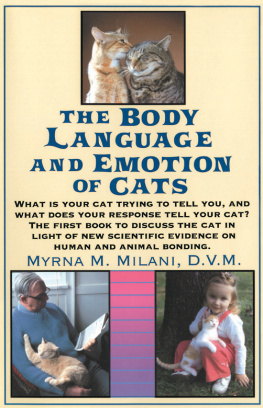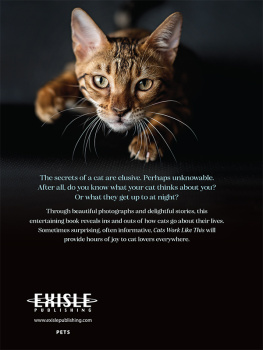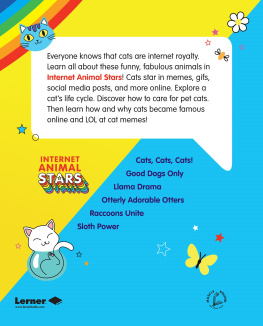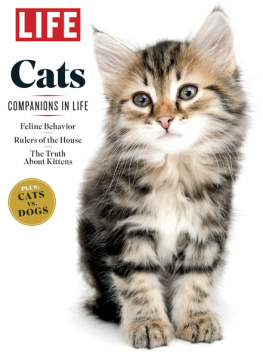MYRNA M. MILANI, D. V. M.
THE
B ODY L ANGUAGE
AND
E MOTION
OF
C ATS

CONTENTS
THE BODY LANGUAGE AND EMOTION OF CATS. Copyright 1987 by Mryna M. Milani
All rights reserved under International and Pan-American Copyright Conventions. By payment of the required fees, you have been granted the non-exclusive, non-transferable right to access and read the text of this e-book on-screen. No part of this text may be reproduced, transmitted, down-loaded, decompiled, reverse engineered, or stored in or introduced into any information storage and retrieval system, in any form or by any means, whether electronic or mechanical, now known or hereinafter invented, without the express written permission of HarperCollins e-books.
Library of Congress Cataloging-in-Publication Data
Milani, Mryna M.
The body language and emotion of cats.
Includes index.
1. CatsBehavior. 2. Cat ownersPsychology.
3. Human-animal relationships. 4. Emotions. I. Title.
SF446.5.M55 1987 636.80887 87-5772
ISBN 0-688-12840-8
EPub Edition SEPTEMBER 2011 ISBN: 9780062127334
7 8 9 10
In memory of Eunice Riedel,
who combined her great love of nature,
understanding of the power of the human/animal bond,
and editing skills,
leaving writer and reader with this very special legacy
Michael Snell and Eunice Riedel, whose encouragement, support, and editing make them both worthy of this paraphrase of Lao-tzu
Good editors are best when writers barely know they exist
Not so good when writers always obey and acclaim them
Worst when writers despise them.
Of good editors, when their work is done and their aims fulfilled,
The writer will say, I did this myself.
This book says what I want it to say because of their help.
Brian Smith, spouse and co-owner of Maggie the cat, who taught me awareness of many other feline dimensions, including their ability to play football in a tiny house, ride motorcycles, enjoy Handel and Mozart, intimidate dogs with the subtlest motions, and unerringly know when humans are busy so that they can streak to the door to demand to be let out or in.
Dick Webber of the Fitzwilliam Depot Store and all the other cat owners who over the years have asked, Why are cats so different? and his cat, Albert, and all the other great cats that made us humans think such deep thoughts.
Comedian George Carlin performs a funny routine called Dogs and Cats that brings to mind William Kunstlers observation, A dog is like a liberal. He wants to please everybody. A cat really doesnt need to know that everybody loves him. When Carlin plays the dog, he perfectly portrays the floppy, sloppy, tongue-lolling pooch who wiggles and wags when the owner comes home, whether after a minutes or a days absence: Youre home! Youre home! I thought you were going to be gone forever and I dont know how to work the can opener, so I rolled this can of food all over the kitchen floor. I love you! I love you! Then Carlin slips into the role of the cat, blinking haughtily as if trying on a new pair of eyes, and murmuring, Oh, its you. Big deal. I killed a mouse for supper. But, hey, if it turns you on, Ill be glad to rub my lean, beautiful body against your legs.
Dog and cat people alike laugh uproariously at the routine, but often for completely different reasons. Dog people relish Carlins ability to describe the intensity of canine devotion, especially when compared to what they see as the cats supercilious detachment. Simultaneously, cat lovers delight in Carlins ability to contrast the typical elegant, independent, and controlled feline behavior with what they perceive as that of a slavish, slobbering dog.
Similarly paradoxical human attitudes toward cats and dogs capture the imagination of two of the most well-known American cartoonists, Charles Schultz, the creator of the Peanuts comic strip, and Jim Davis of Garfield fame. Schultz presents Snoopy the beagle as the epitome of infinite canine qualities, yet few probably even remember the cat, Feron, who was invariably draped like a rag doll over his mistresss arm. On the other hand, Davis portrays Garfield as the infinitely creative feline and his companion, Hobie, as a mindless canine twit. Even though both artists reflect entirely different views, cat owners have little difficulty accepting both.
As if this werent confusing enough, we have tongue-in-cheek books describing all sorts of irreverent uses for postmortem felines that convulse some cat lovers with laughter and others with rage. Or consider a revelation made by best-selling author and radio personality Garrison Keillor when he appeared before the National Press Club. It was a foregone conclusion that the subject of Berthas Kitty Boutique was bound to come up. Berthas, one of the most popular of the imaginary sponsors of Keillors radio show, The Prairie Home Companion, offers cat lovers a wide variety of products and services from cat sneakers and sun screen to charm school, guaranteed to convert your everyday cat to a star or your money back.
As I listened to all the Berthas commercials, like many I envied Keillors ability to cut through the mystique and get to the heart of what was really going on in the most intimate corners of the feline mind. I marveled at his flawless analysis of many human/feline interactions. At times, his observations were so incredible, it seemed he must surely be part cat himself, a cat lover of extraordinary sensitivity.
Imagine how shocked I was when Keillor revealed rather sheepishly that Berthas began as a spoof on the antics of cats and cat owners, both of which he finds totally incomprehensible! What he considered the most outlandish parodies, what should have struck us cat lovers as blatant attacks, had exactly the opposite effect. Countless cat lovers recognized bits and snatches of ourselves and our cats in Berthas ads and laughed uproariouslyand heaved sighs of relief, glad to know our relationships with our cats werent the only bizarre ones.
However, having studied feline behavior and human/feline interactions, it shouldnt have surprised me that such incredible insight comes from a person who defines himself as noncat. All aspects of the human/feline relationship are riddled with such paradoxes, some of them even more unusual and most seemingly unresolvable.
In this book were going to explore how basic feline behavior and body-language expressions make it impossible to evaluate cats in human terms. Regardless of how hard we try, there will always be enigmas and paradoxes that are both unresolvable and uniquely feline. Although we might long to clarify our relationships with our feline friends by amassing support for interpretation A or B as the right way for us and our cats to respond, time and time again the cat demands that we accept A
Next page











